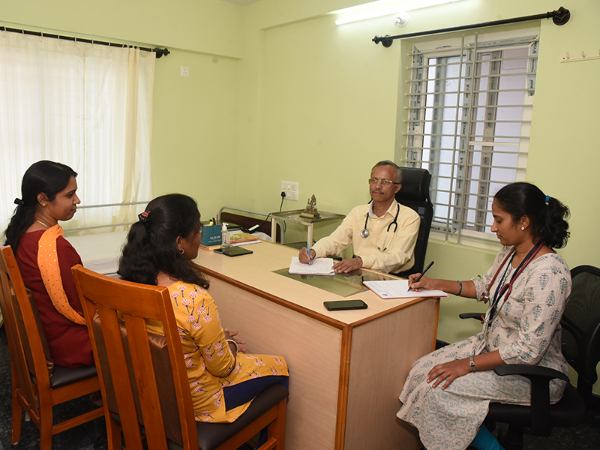 Health Concerns We Address
Health Concerns We Address
We have successfully managed several
emergencies like cardiac, respiratory, and renal issues, offering
personalized care.
 Our
Consultants
Our
Consultants
We have 10+ expert doctors, each
specialized in different Ayurvedic departments, ensuring comprehensive care.
 Modern Facilities
Modern Facilities
Our experts blend modern technology with Ayurveda principles to handle emergencies, providing authentic care to enhance holistic well-being and quality of life.
Read more..In our 20+ years of experience we have treated more
than 15000 cases. We have got expertise in mainly panchkarma. We have
conducted Virechana (Purgation therapy) more
than 3500, Vamana (Emesis therapy) more
than 2500, Basti (Enema therapy) more
than 2400, Nasya more than 1800,
raktmokshana (Bloodletting therapy) nearly 1200.
We have even treated
critical cases like cancer, chronic kidney failure & some of the functional emergencies
arising during the course.
Sriranga Ayurveda Chikitsa Mandira is
an Ayurveda treatment center located in Mysore, India. It is the HEALTH-CARE Division
of Prakruthi Ayurveda Prathishthana®, Mysore. We are dedicated to follow & serve Ayurveda.
The centre was established in 2005 by Dr. Prasanna Venkatesh T.S, a qualified Ayurveda
physician with decades of practical experience in various wings of Ayurveda.


Patients treated

In-Patients

Virechana

Vamana

Basti

Nasya

In the current global scenario, the healing power and value of Ayurveda and other Indian systems like Yoga, Naturopathy etc, are being increasingly appreciated and the world is looking up to India for solution to its prevailing health issues. India is fast becoming a major health care destination. But now – a days, Ayurveda is getting popular more like a spa treatment or massage, where it is restricted to relaxation and rejuvenation packages or wellness therapies rather than its complete utilization of real strengths in preventing and curing diseases.
A Multi-Speciality Ayurveda Hospital
Rooted in the rich tradition of classical Ayurveda, our center offers authentic treatments with a strong focus on Panchakarma (detoxification and cleansing therapies), all at affordable prices. Located in the culturally vibrant city of Mysuru, India, a global hub for Yoga and Ayurveda. We are run by Prakruthi Ayurveda Prathishtana®, a charitable trust committed to promoting genuine Ayurveda for the benefit of society. Unlike many centers that emphasize relaxation therapies with a commercial outlook, we uphold a treatment-based, principle-driven approach that stays true to the classical texts.
In present era, we are witnessing emergence of newer metabolic
disorders like Obesity, Hypertension, Diabetes, Hormonal disorders & the list goes on. Even
the Environmental changes and stressful life are leading to severe Respiratory health issues
( Check your Lungs Health ). Life
threatening conditions such as Kidney disease & Heart diseases require more cost & time
making it difficult for a common man.
“Prevention is better than cure” is the fact.
Ayurveda explains regarding daily regimen, seasonal regimen, Diet & life style etc .
The Ultimate Ayurveda Healing Experience
We don’t just treat symptoms. Our expert Vaidyas (Doctors) identify the root imbalances in patient`s body-mind system and design personalized therapies to restore true health.
Our all treatments follow traditional Ayurvedic principles, performed by trained therapists in calm, hygienic and spiritually uplifting surroundings.
No two patients are alike. Diet / lifestyle / medicines - everything is tailored uniquely to you, after an in-depth consultation.
Whether you're facing a chronic issue or want to detox, our approach nurtures your body, mind and spirit — bringing balance and vitality from within.
Our team of senior Ayurveda physicians carry decades of clinical experience in treating wide range of conditions — including Cancer, Heart care, Infertility, Skin disorders, Obesity and many more.
Our relationship doesn’t end when you leave our Hospital. We offer ongoing guidance, follow-ups and lifestyle coaching to support long-term transformation.
Ayurvedic health tips, lifestyle advices
Testimonials
Sriranga testimonial focus on specific benefits, include customer stories, and end with a clear endorsement, making it genuine, concise, and relatable to potential customers.